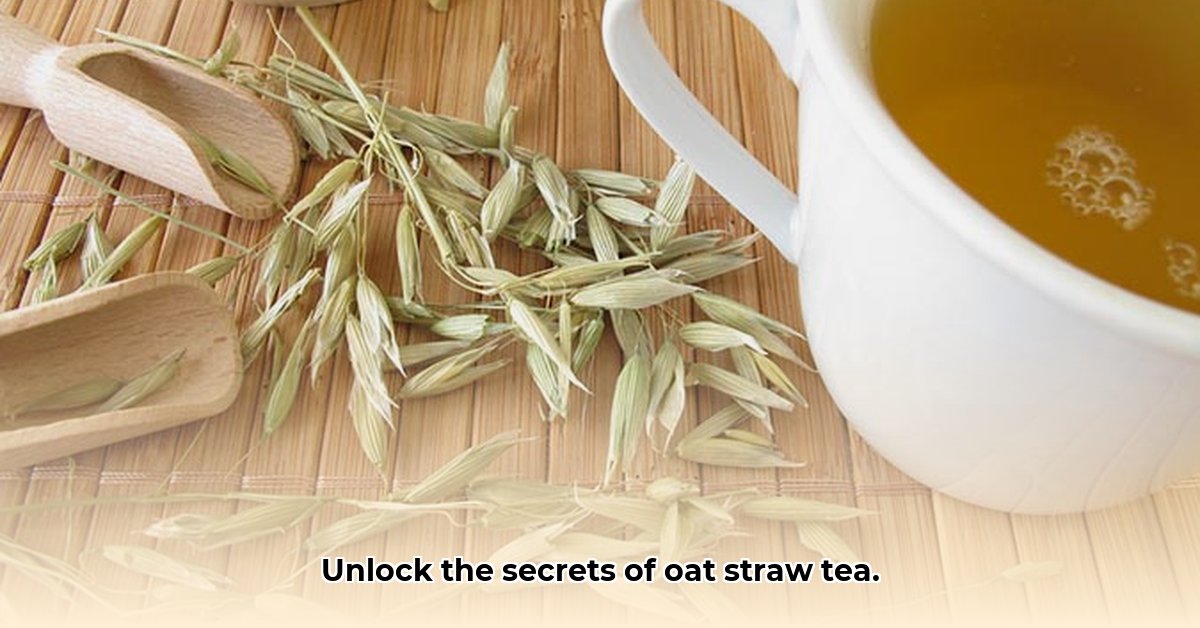
Benefits of Oat Straw Tea: A Natural Approach to Calm
Oat straw, derived from the Avena sativa plant (the same plant that yields oats), boasts a history of use for its calming properties. While not a magic bullet, emerging evidence suggests oat straw tea may offer several benefits for promoting relaxation and improving sleep quality. Let's delve into the specifics.
Oat Straw: A Nervine Tonic for Stress Relief
Feeling overwhelmed? Oat straw is often described as a nervine tonic, meaning it may gently soothe the nervous system. This traditional use suggests potential benefits for managing stress and promoting relaxation. Many find it helps to unwind naturally after a long day. However, more robust clinical trials are needed to confirm these effects definitively. Do you find yourself constantly stressed and searching for natural ways to de-stress?
Nutritional Profile: Vitamins and Minerals for Overall Well-being
Beyond its calming properties, oat straw tea offers a respectable nutritional profile. It contains several essential vitamins and minerals, including calcium, magnesium, and B vitamins—all vital for various bodily functions. It's also a good source of silica, a mineral that may contribute to healthy hair, skin, and nails. One cup of oat straw tea provides a subtle nutritional boost, supporting your body's natural processes.
Antioxidant Properties: Protecting Against Cellular Damage
Oat straw contains avenanthramides, potent antioxidants that combat free radicals. Free radicals are unstable molecules that can damage cells. By neutralizing free radicals, antioxidants like avenanthramides may help protect against cellular damage, contributing to overall health. This antioxidant action may help protect against the wear and tear of daily life, supporting healthy cell function.
Potential Benefits for Skin and Bone Health: Promising, but Requires Further Research
Some preliminary research suggests potential benefits for skin and bone health, possibly linked to oat straw's silica and mineral content. However, these findings are still in their early stages, and more extensive research is needed to validate these effects and determine their clinical significance. While promising, further investigation is crucial to confirm the extent of these potential skin and bone health benefits.
How to Prepare and Use Oat Straw Tea
Making oat straw tea is straightforward. Follow these steps:
- Gather Supplies: Obtain dried oat straw (from a reputable source), a mug, hot (but not boiling) water, and a strainer.
- Steep the Oat Straw: Add 1-2 teaspoons of dried oat straw to your mug.
- Add Water: Pour approximately one cup of hot (around 180-200°F to prevent bitterness) water over the oat straw.
- Brew: Steep for 10-15 minutes; longer steeping times yield a stronger flavor.
- Strain and Enjoy: Strain out the oat straw before enjoying your tea.
Potential Risks and Side Effects: A Balanced Perspective
While generally considered safe, several factors warrant consideration:
- Gluten Sensitivity: Oat straw comes from oats, so there's a risk of gluten contamination. Choose certified gluten-free options if you have gluten sensitivity or celiac disease.
- Drug Interactions: Consult your doctor before using oat straw tea, particularly if taking medications for anxiety, sleep disorders, or other health conditions. Interactions are possible.
- Allergic Reactions: Although rare, allergic reactions can occur. Stop use immediately and consult a doctor if you experience any adverse reactions. Always remember to consult your healthcare professional before incorporating oat straw into your routine, especially if you have pre-existing health conditions or are on other medications.
Scientific Evidence and Ongoing Research: A Critical Assessment
While anecdotal evidence and some preliminary studies support the potential benefits of oat straw tea, large-scale, well-designed clinical trials are still lacking. More research is needed to confirm its efficacy and determine optimal dosages for various health goals. The current understanding is based on traditional use and limited scientific evidence; further investigation is vital.
Conclusion
Oat straw tea presents a potentially valuable addition to a holistic wellness routine. Its potential benefits extend to relaxation, stress management, and a boost to nutritional intake. Remember, though, that while promising, more research is necessary to fully understand its therapeutic potential. As always, consult your healthcare provider before using oat straw tea for medicinal purposes, especially if you have underlying health conditions or are currently taking medications.